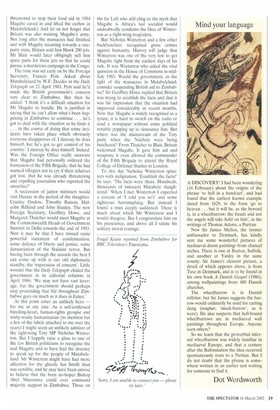Mind your language
A DISCOVERY! I had been wondering (16 February) about the origins of the phrase 'to hell in a handcart', and had found that the earliest known example dated from 1629, in the form 'go to heaven .. . but it will be, as the byword is, in a wheelbarrow: the fiends and not the angels will take hold on him', in the writings of Thomas Adams, a Puritan Now Sir James Mellon, the former ambassador to Denmark, has kindly sent me some wonderful pictures of mediaeval doom paintings from chancel arches. There is one at Bacton, Suffolk, and another at Yaxley in the same county. Sir James's clearest picture, a detail of which appears above, is from Tuse in Denmark, and is to be found in his own book A Danish Gospel (1986), among wallpaintings from 400 Danish churches.
The wheelbarrow is in Danish trilkbor, but Sir James suggests the barrow would ordinarily be used for carting dung (mogbor, 'muck-barrow', as it were). He also suspects that hell-bound wheelbarrows are in mediaeval wall paintings throughout Europe. Anyone seen others?
So we learn that the proverbial infernal wheelbarrow was widely familiar in mediaeval Europe, and that a century after the Reformation the idea occurred spontaneously even to a Puritan. But I do not doubt that the phrase is somewhere written in an earlier text waiting for someone to find it.
Dot Wordsworth
















































































 Previous page
Previous page